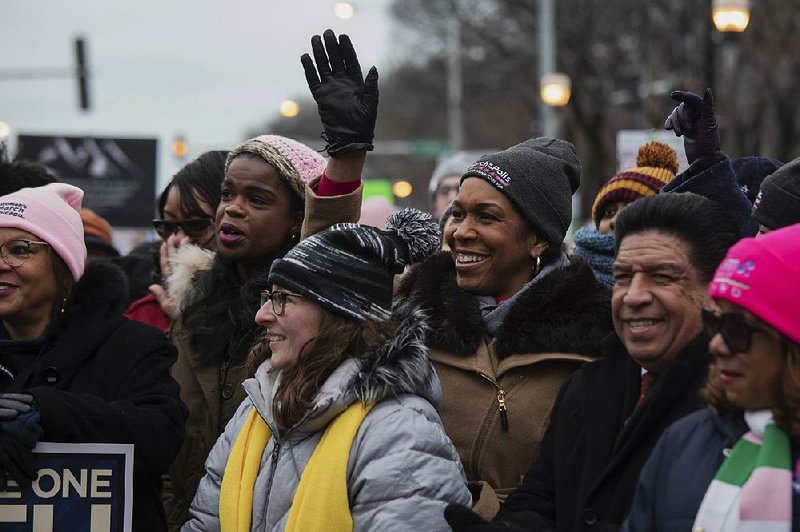WASHINGTON -- Thousands of people gathered in cities across the country Saturday for national Women's March rallies that focused on issues such as climate change, pay equity, reproductive rights and immigration.
Hundreds showed up in New York City and thousands in Washington, D.C., for the rallies, although crowds were noticeably smaller than in previous years. Marches were scheduled Saturday in more than 180 cities.
The first marches in 2017 drew hundreds of thousands of people in cities across the country on the day after President Donald Trump was inaugurated.
In Manhattan on Saturday, hundreds of people gathered as part of a "Rise and Roar" rally at separate events in Foley Square and Columbus Circle.
"Today, we will be the change that is needed in this world. Today, we rise into our power," activist Donna Hylton told a cheering crowd in Foley Square.
Snow began falling by the afternoon in Manhattan, apparently putting a damper on plans for the two groups to converge in large numbers near Times Square.
[Video not showing up above? Click here to watch » https://www.youtube.com/watch?v=cJEGeuKaoiE]
In downtown Los Angeles, thousands of men, women and children filled several blocks as they made their way from a plaza to a park adjacent to City Hall, where a rally featured speeches by Jennifer Siebel Newsom, the wife of California Gov. Gavin Newsom; Mayor Eric Garcetti; U.S. Rep. Maxine Waters; and others.
Jennifer Siebel Newsom credited women for mobilizing against gun violence, creating the #MeToo movement against sexual harassment and discrimination, and taking back the Democratic majority in the House of Representatives.
"In 2020, I have no doubt that it will be women who will lead again, rise up and move this country forward on a path toward justice," she said.
In Denver, organizers opted to skip the rally after the march and instead invited participants to meet with local organizations to learn more about issues such as reproductive rights, climate change, gun safety and voting.
Several thousand participated in the protest in Washington, far fewer than last year when about 100,000 people held a rally east of the White House. But as in previous years, many of the protesters made the trip to the nation's capital from cities across the country to express their opposition to Trump and his policies.
In Washington, three key issues seemed to galvanize most of the protesters: climate change, immigration and reproductive rights.
[Video not showing up above? Click here to watch » https://www.youtube.com/watch?v=BoYsq01dbYM]
"I teach a lot of immigrant students, and in political times like this I want to make sure I'm using my voice to speak up for them," said Rochelle McGurn, 30, an elementary school teacher from Burlington, Vt., who was in D.C. to march. "They need to feel like they belong, because they do."
The protesters planned to march around the White House, but Trump wasn't there. He is spending the holiday weekend at his resort in Florida.
Organizers of the Washington march faced criticism from some area black activists for failing to focus on local issues and damaging the ability of local activists to organize.
"Local D.C. is a domestic colony, and the actions of national organizers have to recognize that," Black Lives Matter D.C. wrote in a letter last week to Women's March organizers. "Here in D.C., these unstrategic mass mobilizations distract from local organizing, often overlook the black people who actually live here and even result in tougher laws against demonstration being passed locally."
Participants said the estimated thousands joining in the Women's March on Philadelphia seemed fewer than last year and certainly down from the 50,000 attracted to the first march in 2017, the day after Trump's inauguration. But the mood was characteristically enthusiastic, determined and supportive.
Allyson Ross of Paoli, attending her third Women's March, is "terrified" about the prospect of Trump being reelected.
[Gallery not loading above? Click here for more photos » arkansasonline.com/119women/]
"I can't even fathom four more years of this," she said.
Women's March Chicago supporters and elected officials marched from Grant Park to Federal Plaza before moving on to Trump Tower where the march ended Saturday afternoon.
Organizers gave a rough crowd estimate of "tens of thousands" for the event.
Mayor Lori Lightfoot, at the front of the procession, said that as a "mother of a daughter," she wants to work to ensure that her child inherits a "better, stronger" world.
"We cannot rest on our laurels," she said.
Information for this article was contributed by Lynn Berry and Daisy Nguyen of The Associated Press; by Angie Leventis Lourgos and Madeline Buckley of The Chicago Tribune; and by Dylan Purcell of The Philadelphia Inquirer.
A Section on 01/19/2020

